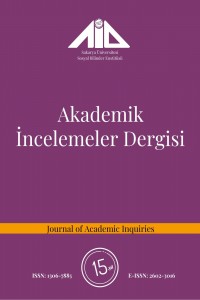Abstract
This study examines the criticisms of the religious radical thought that emerged in the Islamic world after the sixties as an anomaly of the mainstream Islamism and the Islamic movement, directed against mainstream Islamism and Islamists, especially the Ikhwan-i Muslimin. The fact that both schools of thought react to the problems concerning the Islamic world and Muslim society with theo-political sensitivity, causes these two schools to be included in the same category under the definition of "political Islam" from time to time. The main objective of this article is to try to demonstrate that both schools are in complete opposition on many issues through the criticisms of the jihadi salafi ideologues like Omar Abdurrahman, Ayman al-Zavahiri, Abu Muhammed al-Makdîsî, Abu Musab al-Surî and Abu Yahya al-Libi against mainstream Islamists by examining the primary texts of religious radicalism. In this study, these criticisms are examined under three main headings: "In the Context of the Relationship between Religion and Politics", "In the Context of the Relationship between Religion and Law" and "In the Context of the Problem of Islamization Method and the Relationship with the Other".
References
- Abdurrahman, Ömer. Kelimetu Hakk. Kahire: Dâru’l-İ’tisâm, (ts.).
- El-Lecnetu’ş-Şer’iyye bi-Cemâ’ati’l-Cihâd. Fethu’r-Rahman fî’r-Reddi ‘alâ Beyâni’l-İhvân. Word: Minberu’t-Tevhîd ve’l-Cihâd. (ts.). http://www.ilmway.com/site/maqdis/MS_27166.html
- El-Lîbî, Ebû Yahya. Ed-Dîmukrâtiyye: es-Sanamu’l-Âsrî. PDF: Minberu’t-Tevhîd ve’l-Cihâd, (ts.). http://www.ilmway.com/site/maqdis/MS_742.html
- El-Makdîsî, Ebû Muhammed. Ed-Dîmukrâtiyye Dînun. Word: Minberu’t-Tevhîd ve’l-Cihâd, (ts.). http://www.ilmway.com/site/maqdis/MS_26238.html
- El-Makdîsî, Ebû Muhammed. Milletu İbrahim ve Da’vetu’l-Enbiyâi ve’l-Murselîn. Word: Minberu’t-Tevhîd ve’l-Cihâd, 1984. http://www.ilmway.com/site/maqdis/MS_20383.html
- El-Makdîsî, Ebû Muhammed. Keşfu’n-Nikâb ‘an Şerî’ati’l-Ğâb. Word: Minberu’t-Tevhîd ve’l-Cihâd, 1988. http://www.ilmway.com/site/maqdis/MS_38438.html
- Es-Sibâ’î, Hânî. Risâla Hâdi’a li-Kâdeti’l-İhvâni’l-Muslimîn: Eyyu’l-Menheceyni Ahakkun bi’l-İttibâ’. Word: Minberu’t-Tevhîd ve’l-Cihâd, 2006. http://www.ilmway.com/site/maqdis/MS_19821.html
- Es-Sibâ’î, Hânî. El-Meşrû’ul-Amrîkîyyi’l-Cedîd: “El-İslâmu’l-Mu’tedil”. Word: Minberu’t-Tevhîd ve’l-Cihâd, (ts.). http://www.ilmway.com/site/maqdis/MS_21842.html
- Es-Sûrî, Ebû Mus’ab. Da’vetu’l-Mukâvemeti’l-İslâmiyyeti’l-‘Âlemiyye (el-Cuzûr ve’t-Târîh ve’t-Tecârib). Word: Minberu’t-Tevhîd ve’l-Cihâd, 2004. http://www.ilmway.com/site/maqdis/MS_808.html
- Eş-Şankîtî, Ebu’l-Munzir. İslâmiyyûn fî Vahli’d-Dîmukrâtiyye. Word: Minberu’t-Tevhîd ve’l-Cihâd, 2011. http://www.ilmway.com/site/maqdis/MS_737.html
- Eş-Şankîtî, Ebû Abdurrahman. Tehâfutu’d-Dîmukrâtiyyîn. Word: Minberu’t-Tevhîd ve’l-Cihâd, (ts.). http://www.ilmway.com/site/maqdis/MS_12393.html
- Et-Tartûsî, Ebû Basîr. Hazihi Hiye’d-Dîmukrâiyye: Fehel Entum Muntehûn. Word: Minberu’t-Tevhîd ve’l-Cihâd, 1999. http://www.ilmway.com/site/maqdis/MS_26178.html
- Et-Tartûsî, Ebû Basîr. İhfâkâtu’l-Hareketi’l-İslâmiyyeti’l-Mu’âsıra (el-Esbâb ve’d-Difâ’ ve’l-‘İlâc). Word: Minberu’t-Tevhîd ve’l-Cihâd, 2005. http://www.ilmway.com/site/maqdis/MS_27164.html
- Ez-Zevâhirî, Eymen. El-Hasâdu’l-Murr: el-İhvani’l-Müslimin fi Sittîne ‘Âmen. Word: es-Samûdu’l-İ’lâmiyye. 2. Basım, 2005. http://www.ilmway.com/site/maqdis/MS_25064.html
- Kutub, Seyyid. El-Me’âlim fi’t-Tarîk. Kahire: Dâru’ş-Şurûk, 1979.
- Mercan, M. Hüseyin. Müslüman Kardeşlerin Yükselişi ve Düşüşü: İslami Hareketlerde Siyasi Kurumsallaşma Sorunu, İstanbul: İLEM, 2019.
Abstract
Bu araştırma, ana akım İslamcılık düşüncesinin ve İslami hareketin bir sapması olarak altmışlı yıllardan sonra İslam dünyasında teşekkül eden dini radikal düşüncenin, İhvan-ı Müslimin başta olmak üzere ana akım İslamcılık düşüncesine ve İslamcılara yönelttiği tenkitleri incelemektedir. Her iki ekolün İslam dünyasını ve Müslüman toplumu ilgilendiren sorunlara teo-politik hassasiyetle reaksiyon gösteriyor olmaları, bu iki ekolün zaman zaman “siyasal İslam” tanımlaması altında aynı kategoriye dâhil edilmesine neden olabilmektedir. Bu çalışmanın temel amacı; dini radikalizmin birincil metinlerini inceleyip analiz etmek suretiyle her iki ekolün pek çok meselede tam bir karşıtlık içinde olduğunu, Ömer Abdurrahman, Eymen ez-Zevâhiri, Ebû Muhammed el-Makdîsî, Ebû Mus’ab es-Sûrî ve Ebû Yahya el-Lîbî gibi öncü cihâdî selefi ideologların ana akım İslamcılara yönelttiği tenkitler üzerinden göstermeye çalışmaktır. Bu çalışmada söz konusu bu tenkitler; “Din-Siyaset İlişkisi Bağlamında”, “Din-Hukuk İlişkisi Bağlamında” ve “İslamlaşma Yöntemi Sorunsalı ve Ötekiyle İlişki Bağlamında” olmak üzere üç ana başlık altında incelenmiştir.
References
- Abdurrahman, Ömer. Kelimetu Hakk. Kahire: Dâru’l-İ’tisâm, (ts.).
- El-Lecnetu’ş-Şer’iyye bi-Cemâ’ati’l-Cihâd. Fethu’r-Rahman fî’r-Reddi ‘alâ Beyâni’l-İhvân. Word: Minberu’t-Tevhîd ve’l-Cihâd. (ts.). http://www.ilmway.com/site/maqdis/MS_27166.html
- El-Lîbî, Ebû Yahya. Ed-Dîmukrâtiyye: es-Sanamu’l-Âsrî. PDF: Minberu’t-Tevhîd ve’l-Cihâd, (ts.). http://www.ilmway.com/site/maqdis/MS_742.html
- El-Makdîsî, Ebû Muhammed. Ed-Dîmukrâtiyye Dînun. Word: Minberu’t-Tevhîd ve’l-Cihâd, (ts.). http://www.ilmway.com/site/maqdis/MS_26238.html
- El-Makdîsî, Ebû Muhammed. Milletu İbrahim ve Da’vetu’l-Enbiyâi ve’l-Murselîn. Word: Minberu’t-Tevhîd ve’l-Cihâd, 1984. http://www.ilmway.com/site/maqdis/MS_20383.html
- El-Makdîsî, Ebû Muhammed. Keşfu’n-Nikâb ‘an Şerî’ati’l-Ğâb. Word: Minberu’t-Tevhîd ve’l-Cihâd, 1988. http://www.ilmway.com/site/maqdis/MS_38438.html
- Es-Sibâ’î, Hânî. Risâla Hâdi’a li-Kâdeti’l-İhvâni’l-Muslimîn: Eyyu’l-Menheceyni Ahakkun bi’l-İttibâ’. Word: Minberu’t-Tevhîd ve’l-Cihâd, 2006. http://www.ilmway.com/site/maqdis/MS_19821.html
- Es-Sibâ’î, Hânî. El-Meşrû’ul-Amrîkîyyi’l-Cedîd: “El-İslâmu’l-Mu’tedil”. Word: Minberu’t-Tevhîd ve’l-Cihâd, (ts.). http://www.ilmway.com/site/maqdis/MS_21842.html
- Es-Sûrî, Ebû Mus’ab. Da’vetu’l-Mukâvemeti’l-İslâmiyyeti’l-‘Âlemiyye (el-Cuzûr ve’t-Târîh ve’t-Tecârib). Word: Minberu’t-Tevhîd ve’l-Cihâd, 2004. http://www.ilmway.com/site/maqdis/MS_808.html
- Eş-Şankîtî, Ebu’l-Munzir. İslâmiyyûn fî Vahli’d-Dîmukrâtiyye. Word: Minberu’t-Tevhîd ve’l-Cihâd, 2011. http://www.ilmway.com/site/maqdis/MS_737.html
- Eş-Şankîtî, Ebû Abdurrahman. Tehâfutu’d-Dîmukrâtiyyîn. Word: Minberu’t-Tevhîd ve’l-Cihâd, (ts.). http://www.ilmway.com/site/maqdis/MS_12393.html
- Et-Tartûsî, Ebû Basîr. Hazihi Hiye’d-Dîmukrâiyye: Fehel Entum Muntehûn. Word: Minberu’t-Tevhîd ve’l-Cihâd, 1999. http://www.ilmway.com/site/maqdis/MS_26178.html
- Et-Tartûsî, Ebû Basîr. İhfâkâtu’l-Hareketi’l-İslâmiyyeti’l-Mu’âsıra (el-Esbâb ve’d-Difâ’ ve’l-‘İlâc). Word: Minberu’t-Tevhîd ve’l-Cihâd, 2005. http://www.ilmway.com/site/maqdis/MS_27164.html
- Ez-Zevâhirî, Eymen. El-Hasâdu’l-Murr: el-İhvani’l-Müslimin fi Sittîne ‘Âmen. Word: es-Samûdu’l-İ’lâmiyye. 2. Basım, 2005. http://www.ilmway.com/site/maqdis/MS_25064.html
- Kutub, Seyyid. El-Me’âlim fi’t-Tarîk. Kahire: Dâru’ş-Şurûk, 1979.
- Mercan, M. Hüseyin. Müslüman Kardeşlerin Yükselişi ve Düşüşü: İslami Hareketlerde Siyasi Kurumsallaşma Sorunu, İstanbul: İLEM, 2019.
Details
| Primary Language | Turkish |
|---|---|
| Journal Section | Reserch Articles |
| Authors | |
| Publication Date | April 15, 2021 |
| Submission Date | January 28, 2021 |
| Published in Issue | Year 2021 Volume: 16 Issue: 1 |



